- Home
- Barry Unsworth
Land of Marvels Page 18
Land of Marvels Read online
Page 18
By a rather singular coincidence the day he chose was also the day when Major Manning made a reappearance, accompanied as before by an escort of Shammar tribesmen, mounted and armed. He was still occupied with surveying and mapping the region, he explained, now officially commissioned to do so by Sir William Wilcox, in preparation for the important and extensive irrigation projects this great engineer had been appointed, with the full approval of the Ottoman government, to carry out in Mesopotamia.
So this evening, as darkness fell and the lamps were lit, it was, with the sole exception of Elliott, the same company that had sat down to dinner on the evening of the day when the piece of carved stone had been found, that depicting the guardian spirit of the Assyrian kings, which had first turned Somerville’s attention to the eastern side of the mound, where they were digging now.
Fahir lost no time in expressing his doubts directly to the one who was the cause of them, a policy in the main determined by his paradoxical position of being able to admonish, even to threaten, and at the same time feeling essentially powerless. Mesopotamia was full of foreign spies and impostors, who should all be sent packing. But his government felt it unwise to offend the United States or the European powers, even in small matters—and what seemed small might not prove to be so—because the former had made large investments in Anatolia and the latter, by an agreement among them, determined the level of customs duties on imported goods and Turkey desperately needed an increase in these to help shore up her ailing finances. That his country, with its vast imperial possessions—one of the greatest and most enduring empires the world had ever seen—could not set its own customs dues and was regularly blackmailed on this account was a source of private humiliation and rage to Fahir, though he took care not to let this show when he was in the midst of infidel foreigners. As a member of the Young Turk movement he was an infidel himself, but a Muslim infidel, which was something very different to his mind.
His feelings of resentment, as always, took the form of a rather elaborate courtesy. “They tell me,” he said, in his careful English, looking down the table at the American, “that you spend much time examining the surface of the ground. May I ask what it is that you are so earnestly searching for?”
“Sure you may,” Elliott said amiably. “Surface indications are of first importance. The surface offers valuable clues as to where it might be profitable to start digging.”
This seemed for a moment to Somerville, sitting at the head of the table, so audacious a statement of Elliott’s true aims that his breath caught a little. He was not sure he had heard properly; the accent was not always easy, words of two syllables sometimes came out as only one. Had he said “drilling”? The last thing he wanted was for the man to be unmasked now; it would seem to Fahir that by acting as host to one he knew for an impostor he had made himself a partner in the illegal enterprise, which, in a certain way, of course, was true. Then, in addition to the inexorable advance of the railway, which plagued his days and haunted his nights and from which his only relief was the excitement of the discoveries they were making, there would be a squad of Turkish soldiers posted on the site, watching every move, getting in the way. But no look of triumph, no change at all had appeared on Fahir’s face. His head was still inclined forward in the attitude of courteous attentiveness that always seemed ironic in him, like a parody.
“Well, yes,” he said now, “forgive my ignorance, but what kind of clues would be so valuable? We have understood from our friend Somerville that this Tell Erdek was the site of an Assyrian royal palace in the time of the Sargon dynasty. Are you looking for further evidence of this?”
“No, sir, not at all,” Elliott said. “I am not an Assyriologist. My colleagues”—and here he smiled benignly at Somerville—“sometimes tend to think the Assyrian presence in this region the only thing of interest, but there were other empires that preceded theirs. My area of expertise is the Hittite kingdom in the Late Bronze and Early Iron ages. Of course, it is well known that this kingdom was centered in Hattusas, which the Hittites knew as Hattusha, the site of the present village of Boazköy in central Anatolia. Now that is a long way from here, a very long way. But it has to be borne in mind that at its fullest extent, in about 1180 B.C., their empire included most of Syria and all of Mesopotamia, down to Babylon. That is a very considerable extent, sir, very considerable. In fact the Hittites were here first—it was the Assyrians who took over from them. There are Hittite remains scattered all over this region.”
He had spoken with an air of authority that secretly astonished everyone at the table but his questioner. Fahir raised his head. His face had lost all expression. He still persisted, however. “And what kind of remains would signify the presence of these Hittites?”
“Well now, that’s a mighty interesting question. Some consider the Hittites to be the first people to work with iron and thus the first to enter the Iron Age. This is disputed, but obviously any surface traces that could bear it out would be of immense importance. Then again, they were famous for their skill in building and using war chariots. The period when they went from sheathing the wood in bronze to sheathing it in iron is fairly reliably dated, but reinforcing evidence is always desirable. The smallest scrap of metal can be vital in indicating where to take a closer look. Then there are fragments of clay tablets that often lie quite close to the surface. They may bear traces of inscriptions. The Hittites spoke an Indo-European language, as I am sure you know.”
“Yes, of course,” Fahir said. “May I ask who is employing you and financing these investigations? This is not mere idle curiosity on my part, you understand. I am required to furnish information of this sort in the reports I send to my superiors.”
Elliott smiled and nodded with an appearance of full understanding. “I am fortunate enough to have ample funds of my own,” he said. “I can indulge my passion independently. I consider it a great privilege and a great responsibility to be able to shed light on the past, to serve the interest of truth, to strive to add something to the sum total of human knowledge. An understanding of the past is of vital importance, not only for the way we live our lives now but for the way future generations will live theirs. As someone wiser than I has said, if we ignore the lessons of the past, we will be condemned to repeat our mistakes.”
A silence followed on this, rather prolonged, broken by Major Manning, who spoke now for the first time and was clearly as unafraid of anticlimax as he was of practically everything else. “There’s a lot of stuff very close to the surface,” he said. “For part of the way down here I followed the railway. The gravel they use for the bed of the track is full of broken pots.”
He looked directly at the American as he spoke and gave him one of his thin, infrequent smiles, clearly friendly in intent. His words turned the talk toward the progress of the railway, and Fahir for one seemed glad of this. He had spoken to various people, including the German advance party near the excavation site. The general opinion was that the line would reach the site and pass beyond it within a fortnight.
Edith saw the lines of tension gather in her husband’s face as he listened. But her regard dwelled mainly on Elliott, who was silent now and whose face wore a slightly amused expression. He was pleased with himself; he had come through with flying colors. Well before he got here he had chosen this limited field of knowledge, studied it, memorized some salient facts. He had really performed very well, she thought. Such care, such attention to detail, could only be admired. Daddy would have given the same sort of consideration to one of his cases. But it was not quite admiration that she felt now as she looked at him. The care he had taken had been in support of falsehood, a pack of lies, in fact. Was that the difference? But Alex was a man of vision, a man of fire. He was striving to unlock the secrets of the earth, Pluto’s kingdom. Once embarked on a necessary deception he would bear it out, make it good, rejoice in the triumph of prevailing. Was not this better than to be like John, the victim of deception, the poor dupe?
Th
us she struggled to preserve the idealism of the man who had made the gift of fire to her, but could not succeed altogether, not while his face still held that look of satisfaction. And it was this failure that gave a certain coldness to her manner when the time came to say good night to him.
In bed, before sleep came, she went on thinking about it. She heard her husband moving about in the next room and tried to fight off the pity for him that came with the memory of his face, so drawn with anxiety, at the dinner table. She had always hated the emotion of pity, when she felt it for others, when she felt herself the object of it; it was this that had made her draw back from Patricia, the note of pity she had heard, or thought she had heard, during their argument about voting rights for women. Pity was negative; it was defeat . . . She thought again of that little smile on Alex’s face. It was more than relief at having passed the test; he had enjoyed outwitting Fahir.
He had been so earnest, so fervent. That blaze of sincerity in the blue eyes, that straight, unwavering regard, the voice that came in blurts, like the very throes of truth. But what struck her most in retrospect was the way he had spoken about the future of humanity, the benefits that would come to future generations. Not from oil this time but from a knowledge of Hittite war chariots. He had spoken with a conviction that had nothing to do with his knowledge of archaeology, was independent of it. It was as if, at a certain point, the mantle of prophecy fell on him, and then knowledge or ignorance, truth or falsehood didn’t matter any longer. She remembered how he had clenched his fists as he spoke of the hot embrace of the rock, a sacred fire in a past so remote she couldn’t imagine it, and how the same passionate awe had throbbed in his voice when he went on to speak about the present and the future, the statistics of production, the profits to be made. The same fire . . . It was in the puzzlement of this that she finally passed into sleep.
Elliott had noticed the more distant manner, the way her eyes did not quite meet his own when she bade him good night. He did not trouble himself too much as to what the cause might be; it could not be anything to do with him, he felt sure of that; he had been brilliant at the table, he had held his nerve, she should have been impressed. Women were subject to moods; the fact was well known. However, he took it for a sign that they would not be meeting that night; she would not be coming to him, entering his room and joining him in bed, hot with her own stealth and eagerness—it was quite a while since he had had a woman so ardent.
All the same, he did not mind, tonight, if she did not come. In a way he was glad of it. He wanted to have time to himself on this, one of the most important days of his life, as he felt it to be, a highlight in his career. His victory in the game with Fahir, that triumphant parade of knowledge, had been a sort of celebration, in a minor key, of the momentous discovery he had made earlier that day, about which, naturally, he had said nothing to anybody.
They had returned to the pyramid of stones on the following day. He had gone over that shallow rise, which was roughly oval in shape and covered something like a mile from north to south and perhaps half of that at its maximum width. As he tramped back and forth, the conviction had grown in him that it formed a single geological structure. His work party, who he knew had long ago decided that he was mad, he left to their own devices. His excitement had grown at the thought of what this formation might be. He had felt neither weariness nor any discomfort from the sun. Then today, in late afternoon, when the sun’s rays were slanting low and shadows were long, he had ridden to a point some two miles beyond where the sweep ended. Here the ground rose fairly sharply to a rocky shelf. It was no more than a hundred feet in height, but standing here and looking back the way he had come, with the sun’s rays slanting across, he saw beyond any doubt that it was a single unit he had been traversing, a single shape, a diapir.
How long he had stood there, as the realization came to him, he could not afterward recollect. Some massive formation of the rock had been forced up to pierce the surface, hardly perceptibly, like the slightest protrusion of the tongue between the lips. No, not quite like that: It had no crest or peak; it was a single shallow dome, the cap of rock that had formed over it. He remembered the water charged with salt, the taste of it on his fingers, the prevalence of salt springs everywhere. This great cylindrical mass pushing up from below, piercing the surface, could it be rock salt?
Conviction had grown as he thought about the dimensions of the thing. If it was a mile across on the surface, it could be five or six miles in depth below. Salt, being lighter in density than the surrounding rocks, was often forced up, but very rarely in quantities like this. He had read about salt domes but never seen one. They had been observed in various places, the Gulf of Mexico, the Zagros Mountains, southern Persia. But no prospecting had been done yet, none that he knew of. After the millions of years of heating and compression that had molded the dome and forced it up, the salt, in its rise, would have wrenched out of shape the strata containing the petroleum, forming perfect traps . . .
The excitement that had seized him in the afternoon as he stood looking down returned to him now, set him pacing backward and forward in his room. As always, a sense of the miraculous attended on him—the nearest he ever came to ethical feeling, though it transcended all notions of right or wrong. How many millions of years, how many floods and evaporations in the shallow sea that had once been Mesopotamia had gone to form these vast deposits of salt? In its slow, irresistible journey up to the surface, the salt would bend the layers of rock above it, bend them upward, forming pockets where oil and gas would collect, trapped along the flanks of the cone, between the salt and the enclosing rock. The dome-shaped cap of rock forced up to the surface, this could have formed a reservoir above the salt, where oil might gather. A lake of oil, not far below, easy to get at. Closer examination would be needed, but this would explain the oil seep, the swamps of bitumen . . .
He was disturbed in this excited reverie by a light tapping at his door. His first thought was that Edith had decided to visit him after all. But it was too early for this. He opened the door to find the British major at the threshold. Manning looked neat and spruce in a white shirt and white shorts and white stockings that rose just below the knee. There was about him a slight odor of what Elliott thought might be disinfectant soap.
“I hope it’s not too late for a visit,” he said, “but I am a great believer in prompt action.”
“I guess that’s the military training.” Elliott stood aside for the major to enter. What kind of action could he mean? Perhaps it was hair lotion or the sort of thing one put on one’s face after shaving. Could the major have shaved before coming to pay this visit? Could some glance or word of his own have been misunderstood, misinterpreted? The British picked up some kinky habits at those schools of theirs, that was common knowledge. The clipped mode of speech, the mannerism, noticed at dinner, of tightening the lips, causing the carefully trimmed, gingerish mustache to bristle slightly—was there some wrestling with impulse going on there? Better get him sitting down as soon as possible.
“Have a seat,” he said, pointing to one of the two upright chairs at opposite sides of a small table, all the seating there was in the room. “Would you care for a drink? I’ve still got some of the Scotch left that I brought with me from London.”
“Thank you, just a spot.”
“Water?”
“No thanks, just as it comes.”
Manning watched the American as he poured out the drinks. A tall man, steady-handed, moving easily on his feet, with a direct and open regard and a sort of shine about him, as if the light fastened on him, favored him in some way. No telling from appearances. That unblushing reference to London, scene of his treachery. This was the traitor who was working for two conflicting interests, two countries on the verge of war, and taking payment from both. Such baseness was hardly conceivable; it was beneath contempt. He felt more than ready to carry out the orders he had received; he felt it as a mission. He was on duty; it was why he had taken pains with
his appearance, shaving and dressing carefully before his visit. “Well, cheerio, down the hatch,” he said, raising his glass to Elliott, who had taken the chair opposite.
“Your very good health, sir,” Elliott said, managing to infuse this accustomed phrase with accents of deep and heartfelt sincerity.
“Won’t beat about the bush, don’t believe in it, never have,” Manning said. “I am the bearer of a letter from Lord Rampling, authorizing me to collect your interim report and convey it back to London.”
“Interim report? I haven’t made an interim report. I wasn’t asked to make an interim report, not at this early stage. There must be some mistake.”
“No mistake.” Manning’s right hand went to the breast pocket on the left side, unfastened the button, drew out a sealed envelope, and laid it on the table.
“No, I don’t mean to doubt the genuineness of the letter . . .” Elliott paused a moment or two, then said more slowly: “No, I meant some confusion about the nature of my instructions.” Looking across the table, he saw the major’s mouth tighten in that slightly lopsided involuntary grimace. “I’ve not been here long enough to make a comprehensive report,” he said. “All I’ve got are notes. How come you have been saddled with this business?”

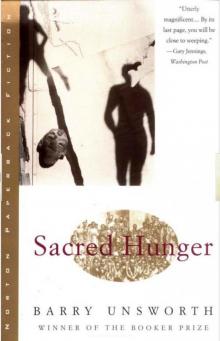 Sacred Hunger
Sacred Hunger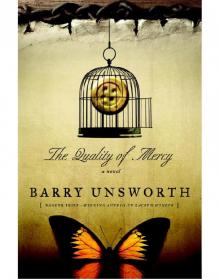 The Quality of Mercy: A Novel
The Quality of Mercy: A Novel The Songs of the Kings: A Novel
The Songs of the Kings: A Novel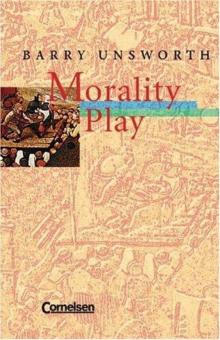 Morality Play. Mit Materialien. (Lernmaterialien)
Morality Play. Mit Materialien. (Lernmaterialien)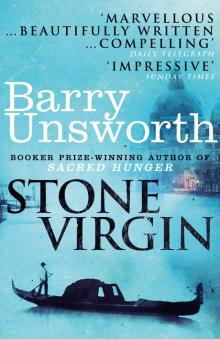 Stone Virgin
Stone Virgin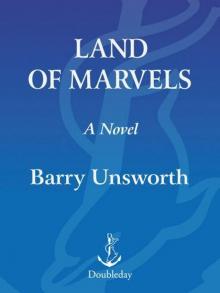 Land of Marvels
Land of Marvels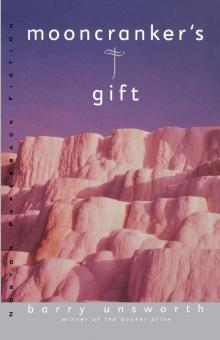 Mooncranker's Gift
Mooncranker's Gift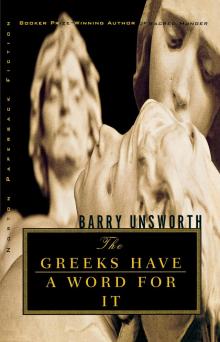 The Greeks Have a Word for It
The Greeks Have a Word for It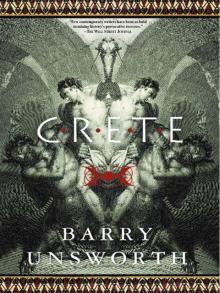 Crete
Crete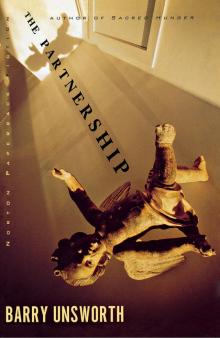 The Partnership
The Partnership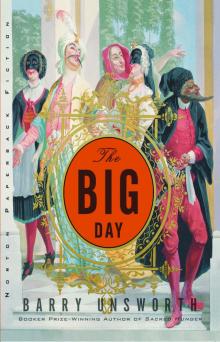 The Big Day
The Big Day The Hide
The Hide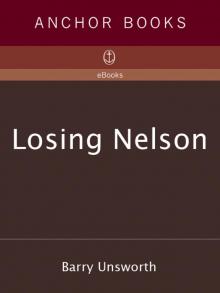 Losing Nelson
Losing Nelson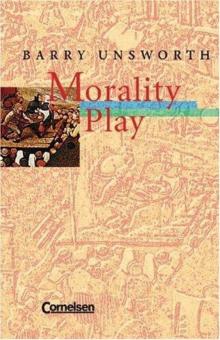 Morality Play
Morality Play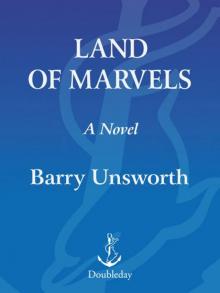 Land of Marvels: A Novel
Land of Marvels: A Novel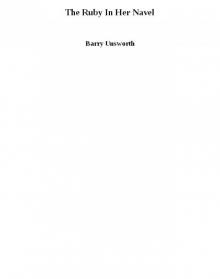 The Ruby In Her Navel
The Ruby In Her Navel